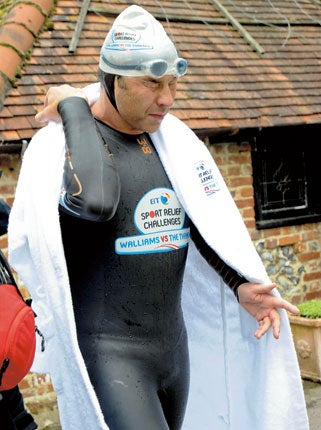David Walliams' suffering with Thames tummy prompts donation surge
The Thames is full of bacteria and other pathogens waiting for those brave or foolhardy enough to swim in it

Your support helps us to tell the story
From reproductive rights to climate change to Big Tech, The Independent is on the ground when the story is developing. Whether it's investigating the financials of Elon Musk's pro-Trump PAC or producing our latest documentary, 'The A Word', which shines a light on the American women fighting for reproductive rights, we know how important it is to parse out the facts from the messaging.
At such a critical moment in US history, we need reporters on the ground. Your donation allows us to keep sending journalists to speak to both sides of the story.
The Independent is trusted by Americans across the entire political spectrum. And unlike many other quality news outlets, we choose not to lock Americans out of our reporting and analysis with paywalls. We believe quality journalism should be available to everyone, paid for by those who can afford it.
Your support makes all the difference.It is distinctly unpleasant for David Walliams but the stomach bug he is battling as he swims along the Thames is filling the Sport Relief coffers.
An outpouring of sympathy for the comic as details of his "Thames tummy" symptoms leaked out has resulted in a surge of people promising to donate money. He has told organisers he has no intention in giving up the 140-mile swim despite diarrhoea, vomiting and a high temperature, and his determination has won widespread admiration that is being turned into cash.
By mid-afternoon yesterday, with the twittersphere buzzing with sympathy and promises to donate, and supporters lining the river banks to cheer him on, more than £330,000 had been collected. He had hoped to reach Henley by last night but his weakened condition prevented him getting so far.
Walliams probably caught his stomach bug from the waters of the river Thames which despite its reputation as one of the cleanest major rivers worldwide is full of bacteria and other pathogens waiting to catch those brave or foolhardy enough to swim in it.
Not only is there a disease risk from "organic material" from livestock and wild animals, but in some stretches of the Thames more than 50 per cent of the water has been pumped in from sewage treatment plants.
It is, said environmental microbiologist Andrew Singer, swimming with bugs. "You don't need raw sewage to get sick," he said. "The treatment process isn't intended to remove all the pathogens. It's clean if you are a fish and can't get infected by human pathogens. As far as the cleanliness of the river goes for people, it depends what you mean by 'clean'. It has far less pollution that it ever did but it's not good for us to be in it." Dr Singer, of the Centre for Hydrology and Ecology, said the most likely source of the bug was water discharged from Swindon.
A spokeswoman for Thames Water said: "The Thames is not a designated bathing area and therefore the Environment Agency does not require us to disinfect the treated waste water before it goes back into the river.
"We comply with all standards set by the EA and use a thorough treatment process so as not to have any harmful impact on the environment. However, some pathogens will still be in the water when it goes back into the river." She said it was only once the river reached London that there was any risk of raw sewage being washed into the Thames from storm overflows.
Walliams prepared for the swim by undergoing several inoculations to protect him from diseases, and started on a course of antibiotics. But the illness could be more serious than just a stomach upset. Weils Disease, Legionnaires' disease, E.coli and cryptosporidiosis are some of the possibilities.
"What he has could be nasty," said Dr Singer. Sport Relief organisers said his condition was being constantly monitored by medics.
In 1958, the Thames was so polluted it was declared biologically dead. However, it has been cleaned up to the point that it is now home to at least 125 species of fish and a host of other wildlife.
Alistair Driver, National Conservation manager of the Environment Agency, said more needed to be done but there had been "an incredible" transformation in the last 30 years. He also noted the irony that some of the money raised by Walliams would be spent on providing clean water in poor countries.
Join our commenting forum
Join thought-provoking conversations, follow other Independent readers and see their replies
Comments